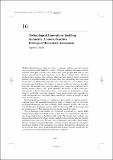Technological Innovations Enabling Automatic, Context-Sensitive Ecological Momentary Assessment
Author(s)
Intille, Stephen S.
DownloadIntille_Technological Innovations.pdf (717.3Kb)
PUBLISHER_POLICY
Publisher Policy
Article is made available in accordance with the publisher's policy and may be subject to US copyright law. Please refer to the publisher's site for terms of use.
Terms of use
Metadata
Show full item recordAbstract
Health-related behavior, subjective states, cognitions, and interpersonal experiences are inextricably linked to context. Context includes information about location, time, past activities, interaction with other people and objects, and mental, physiological, and emotional states. Most real-time data collection methodologies require that subjects self-report information about contextual influences, notwithstanding the difficulty they have identifying the contextual factors that are influencing their behavior and subjective states. Often these assessment methodologies ask subjects to report on their activities or thoughts long after the actual events, thereby relying on retrospective recall and introducing memory biases. The “gold standard” alternative to these self-report instruments is direct observation. Direct observation in a laboratory setting, however, artificially constrains behavior. Direct observation is also typically too costly and invasive for long-term, large-sample-size studies of people in their natural environments.
Date issued
2007Department
Massachusetts Institute of Technology. Department of ArchitectureJournal
The science of real-time data capture: self-reports in health research
Publisher
Oxford University Press
Citation
Intille, Stephen S. "Technological innovations enabling automatic, context-sensitive ecological momentary assessment ." (Eds.) Arthur Stone et al. The science of real-time data capture: self-reports in health research. Oxford: Oxford University Press, 2007. p. 308-337.
Version: Final published version
ISBN
0195178718
9780195178715